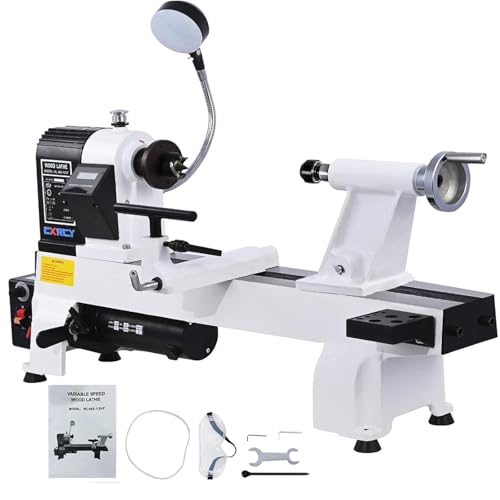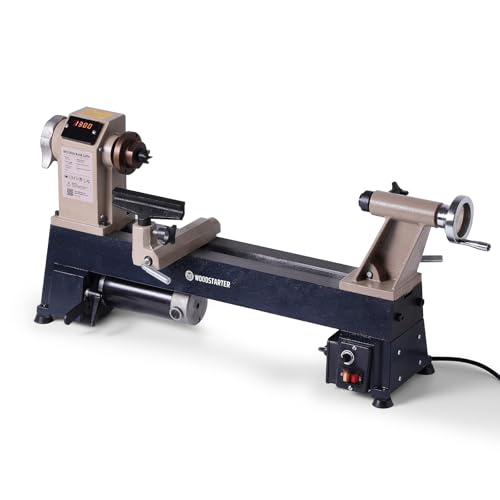Woodturning has always been a craft that blends skill, creativity, and the right tools. In 2025, choosing the right lathe can feel overwhelming with so many options on the market. But here’s the good news—you don’t have to sort through endless specs on your own. Whether you’re searching for the best wood lathe for beginners to start your first projects or aiming for the best wood lathe for turning bowls to expand your skills, the right choice makes all the difference. And if you’re curious about budget-friendly yet reliable picks, we’ll also highlight the best wood lathes for beginners that offer excellent value. So, what’s next? Keep reading as we break down the top 10 models of the year, comparing features, durability, and performance to help you find the perfect fit for your workshop.
Top pick
Best Versatile Speed: WEN 4.5-Amp 12-Inch by 18-Inch 5-Speed Benchtop Wood Lathe
The WEN 4.5-Amp 12-Inch by 18-Inch Benchtop Wood Lathe offers a versatile woodworking experience with five adjustable speeds ranging from 520 to 3400 RPM. It can handle workpieces up to 18 inches long and 12 inches wide. The included 3-1/8 inch faceplate allows for turning bowls and other non-spindle projects. Installation and center changes are simplified with the 1-inch x 8 TPI to M14-1.5 adapter. The kit comes with three multi-spur drive centers and two MT2 live centers for precise turning.
Users and woodworking specialists appreciate the WEN lathe for its versatility and ease of use, particularly for hobbyists and small workshop projects. While not designed for heavy industrial use, it performs reliably for general woodworking tasks and bowl turning.
This WEN lathe delivers solid performance, flexibility, and value, making it a strong choice for beginners and intermediate woodworkers seeking an all-in-one benchtop solution.
Best Precision Control: 12" x 18" Digital Display Benchtop Wood Lathe
This 12" x 18" benchtop wood lathe features a 3/4HP pure-copper motor and an 18-inch distance between centers with a 12-inch swing over the bed, accommodating a wide range of projects. It offers infinitely variable speeds from 650 to 3800 RPM, divided into low, mid, and high ranges for precise control. A high-definition digital display shows RPM clearly during operation. The lathe comes with a 4-inch 4-jaw chuck set made of 1045 steel and alloy steel screws for durability and reliable wood gripping. Compatible with most lathes via a 1 x 8 TPI thread, this kit improves efficiency and flexibility for woodworking projects.
Woodworkers and hobbyists value this lathe for its precision control and robust build, noting that the variable speed and digital display make it easier to achieve accurate results. While it requires protective eyewear and some experience, it is highly effective for turning bowls, pens, vases, and other intricate pieces.
With its large capacity, precise speed control, and durable chuck set, this lathe offers excellent versatility and performance, making it a strong option for both serious beginners and intermediate woodturners.
Best Compact Power: 10" x 18" Benchtop Wood Lathe, 1/2HP Variable Speed 5 Settings
The 10" x 18" benchtop wood lathe features a 1/2HP copper motor and five adjustable speeds ranging from 500 to 3200 RPM via belt changes. It accommodates projects up to 18" long and 10" wide, with an easily adjustable tailstock for flexibility. The lathe includes MT2 spindle compatibility with spur and live centers for secure turning. Its heavy-duty cast iron construction reduces vibration, while rubber feet enhance stability and quiet operation. The compact design makes it ideal for small workshops and detailed projects such as pens, bowls, and toys.
Users appreciate the lathe’s solid build and versatility for small woodworking tasks. Its compact size does not compromise power, making it suitable for hobbyists and beginners, although belt adjustments may take some practice.
This lathe balances size, power, and precision, offering reliable performance for detailed woodworking projects in limited spaces, making it an excellent value for small workshops and personal use.
FAQs
What is the German brand of lathe?
Germany is known for producing high-quality, precision engineering tools, including lathes. Some of the most reputable German lathe brands include DMG Mori, Bodor, and Leinen. DMG Mori is especially recognized for its industrial CNC lathes, offering precision, durability, and advanced automation features. Leinen focuses more on woodworking lathes, providing machines with robust construction and reliable performance. German lathes are often praised for their long-term reliability, precise tolerances, and innovative engineering, making them a popular choice for both professional and high-end hobbyist use.
What is a good starting lathe?
A good starting lathe should be user-friendly, compact, and versatile enough for various projects. For beginners, benchtop wood lathes between 10 to 12 inches in swing capacity and 16 to 18 inches between centers are ideal. These lathes often come with variable speed settings, easy-to-use tailstocks, and basic accessories like spur centers and live centers. Brands such as WEN, JET, and RIKON are commonly recommended for beginners because they balance affordability, reliability, and ease of use. A beginner-friendly lathe allows new users to practice turning pens, bowls, and small spindle projects safely while building foundational skills.
What is the most common lathe machine?
The most common lathe machines vary depending on the industry. In woodworking, benchtop wood lathes are widely used due to their affordability and space-saving design. In metalworking, engine lathes dominate workshops because of their versatility in turning, facing, threading, and drilling operations. Engine lathes are generally larger and heavier, suitable for industrial or professional use, while benchtop lathes are more common in hobbyist or home workshops. Across both applications, lathes with variable speed control, standard spindle fittings, and reliable motor performance are the most frequently used.
What is the lifespan of a lathe?
The lifespan of a lathe depends on its build quality, maintenance, and frequency of use. High-quality metal or woodworking lathes can last 20 to 30 years or more when properly maintained. Routine maintenance includes lubrication of moving parts, keeping the bed clean, checking alignment, and replacing worn components. Lower-end or hobbyist lathes may have a shorter lifespan of 5 to 10 years under regular use. Ultimately, investing in a well-built lathe and following proper maintenance practices can significantly extend its functional life, making it a long-term asset for any workshop.
Conclusion
Choosing the best wood lathe ultimately comes down to your specific needs, skill level, and the types of projects you plan to tackle. For beginners, a compact benchtop model with variable speed and easy-to-use accessories can provide a smooth learning curve and reliable results. More experienced woodturners may benefit from larger lathes with higher horsepower, extended swing capacity, and advanced features like digital speed displays or durable chuck sets. Across all types, the key factors remain precision, stability, and durability, ensuring consistent performance over time. By considering these elements and comparing the top-rated models, you can find a wood lathe that not only meets your immediate needs but also supports your growth as a woodturner for years to come.













